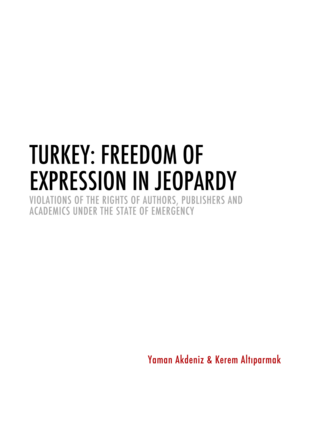
Firstly the authors present a historical evaluation of the country’s media freedom and freedom of expression records as a member state of the Council of Europe (CoE), stating that Turkey “has always been one of the most restrictive countries” among the member states of the CoE. They support their statement by data on judgements issued by the European Court of Human Rights (ECtHR):
- Between 1959 and 2017 the ECtHR has issued the 16,36% of its total judgements involving Turkey as a respondent State. Among the 3.386 judgements issued the ECtHR found a violation in 2.988 cases.
- Among these 281 were judgements in which the ECtHR has found a violation of freedom of expression under Article 10 of the European Convention on Human Rights (ECHR). In this respect Turkey ranks first, followed by Russia with 39, France with 37 and Austria with 35.
According to the writers, significant improvements made in consideration of these judgements were overshadowed by the limited approach of Turkish local courts in implementing the ECHR standards. “For the past twenty years, the main issue restricting public debate in terms of Turkish laws has been the prosecution and imprisonment of journalists, writers and intellectuals on the grounds that they contribute to violence and terrorism”. Accordingly, the main themes in cases of freedom of expression brought before the ECtHR against Turkey are terrorism and violence.
A number of changes have taken place in regards to the restriction of freedom of expression in Turkey in the last 40 years.
- In the 1980s and 1990s, most freedom of expression related prosecutions concerned the denigration of Atatürk, Turkishness and the territorial integrity of the state.
- Under the rule of the Justice and Development Party - AKP (since 2002), these have been replaced by prosecutions involving denigration of religion, the government and defamation of the President.
- Recourse to anti-terrorism legislation, frequently invoked in the 1990s, was toned down in the first period of AKP rule.
- The recourse to anti-terrorism legislation, which started to be frequent in the following years, has become even more pervasive after the end of the Peace Process and the attempted coup of 15 July 2016. Fighting terrorism became the main grounds for interfering in freedom of expression.
The report affirms that currently “Turkey is going through a period in which anyone thought to be in the opposition, including but not limited to academics, members of parliament, artists, journalists and writers, can be investigated, arrested and prosecuted for disseminating terrorist propaganda or for being a member of a terrorist organisation”.
The writers also survey the changes that have occured over time in the means adopted to fight terrorism. Whereas in the 80s and 90s the methods employed were “rough", under the rule of the AKP they have become more “subtle and sophisticated”. For instance, physical attacks against journalists have become rare and incidents of torture and ill-treatment of students and intellectuals are exceptional. On the other hand, it is said that a flimsy pretext is enough to file a criminal case against anyone who criticises the government, while the accused are found guilty in most of the cases.
Other means mentioned in the report to limit freedom of expression include:
- prosecutions and criminal sanctions;
- prior restraints;
- blocking access to websites and social media platforms (issued by the Criminal Judgeships for Peace)
- controlling of TV and Radio (by the governmental Supreme Board of Radio and Television)
- onslaughts by pro-government media outlets against journalists and newspapers
The report also provides statistical data on the effects of the State of Emergency that has been declared by Turkish authorities after the attempted coup, and which currently enforced:
- 116,250 people were dismissed from public service.
- 140 media organisations including television, radio and periodicals, and 30 publishing houses were shut down. 18 periodicals were also closed.
- It is estimated that at least 2,500 media workers have become unemployed.
- 5,822 academics had been dismissed from 118 public universities.
Finally, the study presents some high profile cases to better explain the ambiguous nature of terrorism related accusations in Turkey. The case studies examined concern:
- Aslı Erdoğan, on trial in relation the case against Özgür Gündem newspape;
- Necmiye Alpay, on trial in the case of Solidarity for Özgür Gündem;
- Ahmet Altan who was sentenced to life imprisonment in the case of the FETÖ/PDY media organisation;
- Ahmet Şık with regards to the case of Cumhuriyet newspaper;
- Atilla Taş with regards to yet another FETÖ/PDY media organisation case.
The content of this article can be used according to the terms of Creative Commons: Attribution-NonCommercial 4.0 International (CC BY-NC 4.0) . To do so use the the wording "this article was originally published on the Resource Centre on Media Freedom in Europe" including a direct active link to the original article page.

